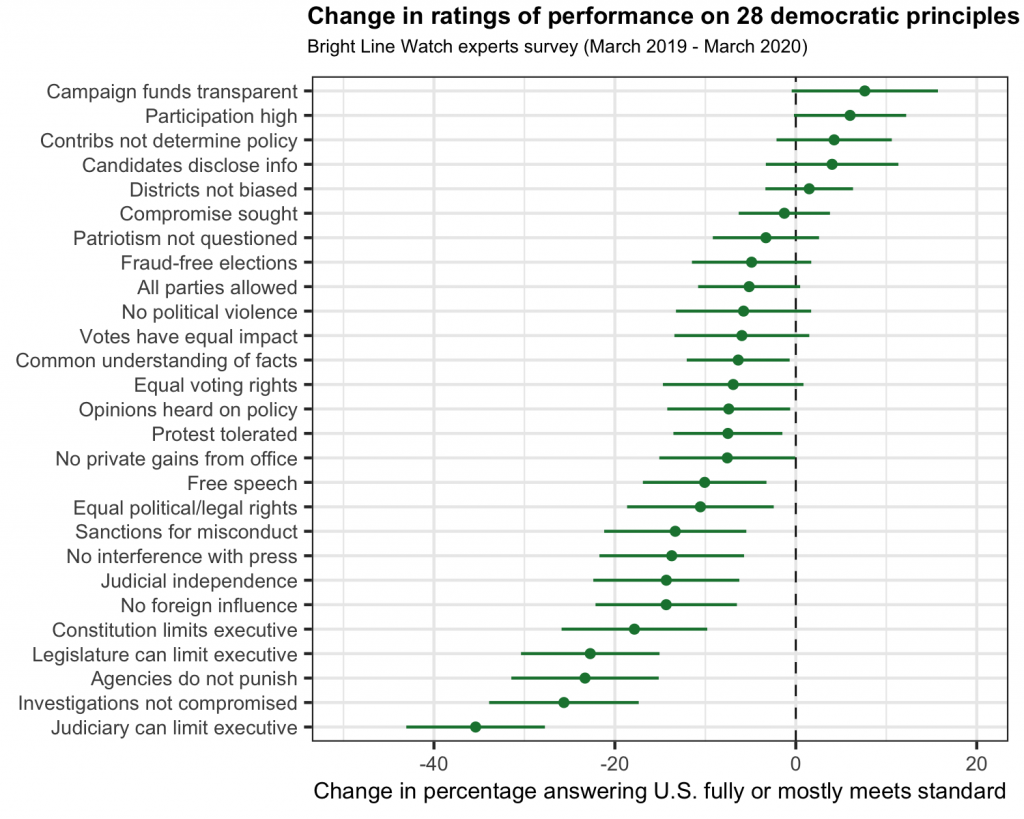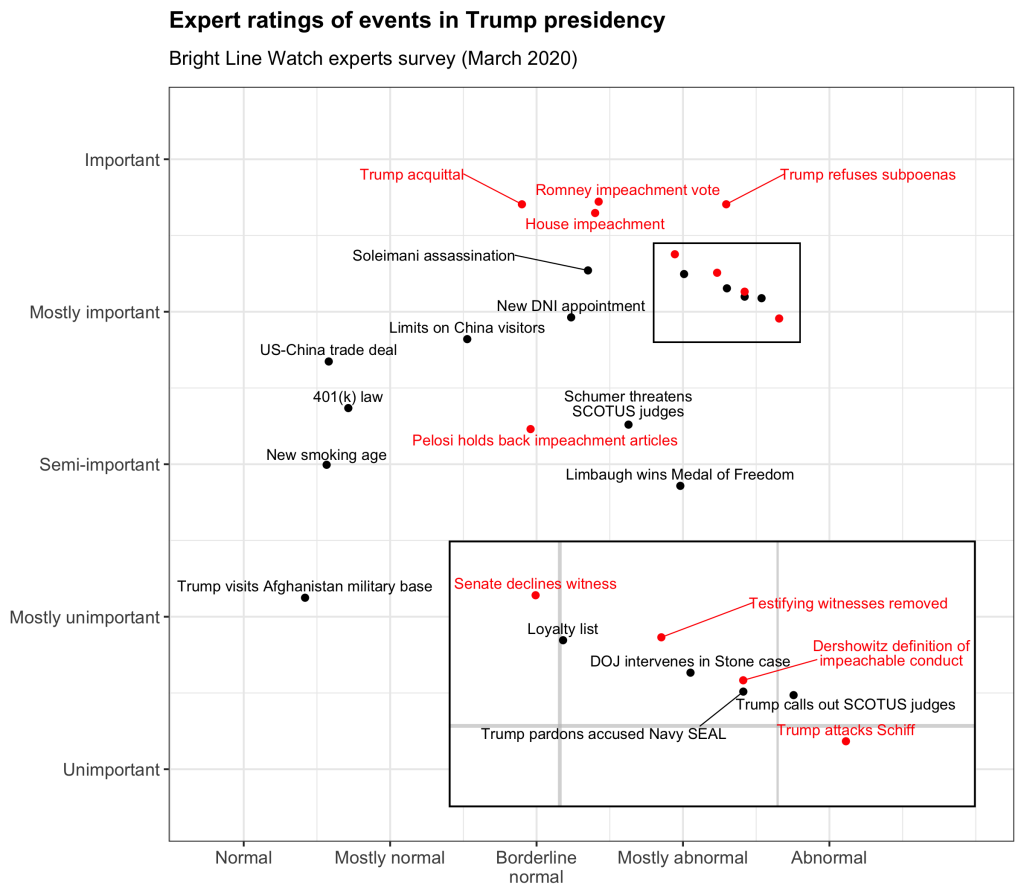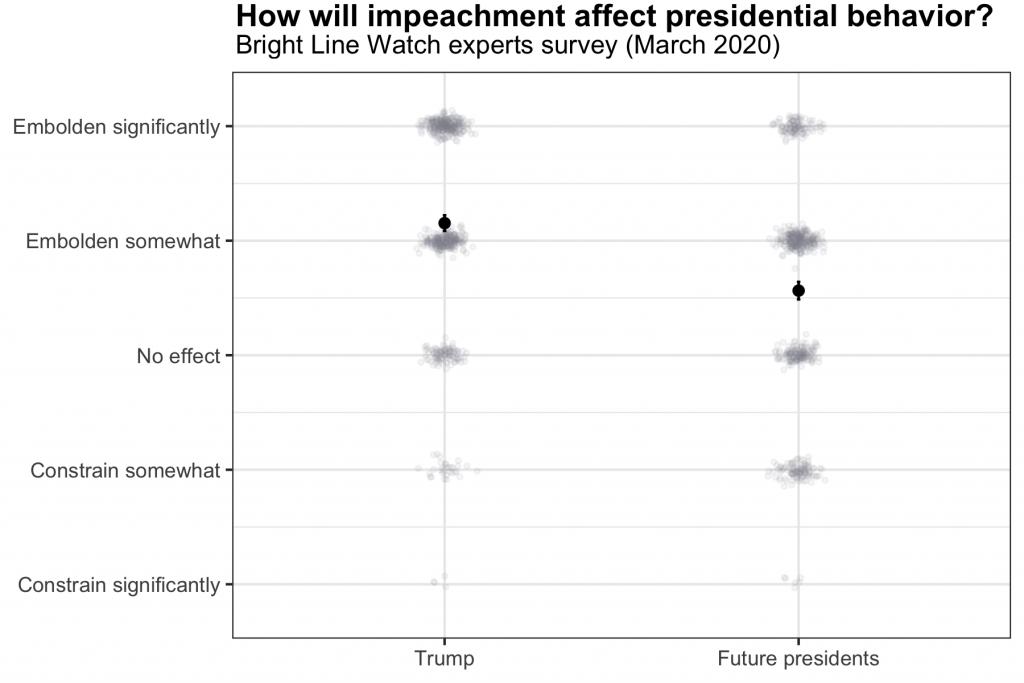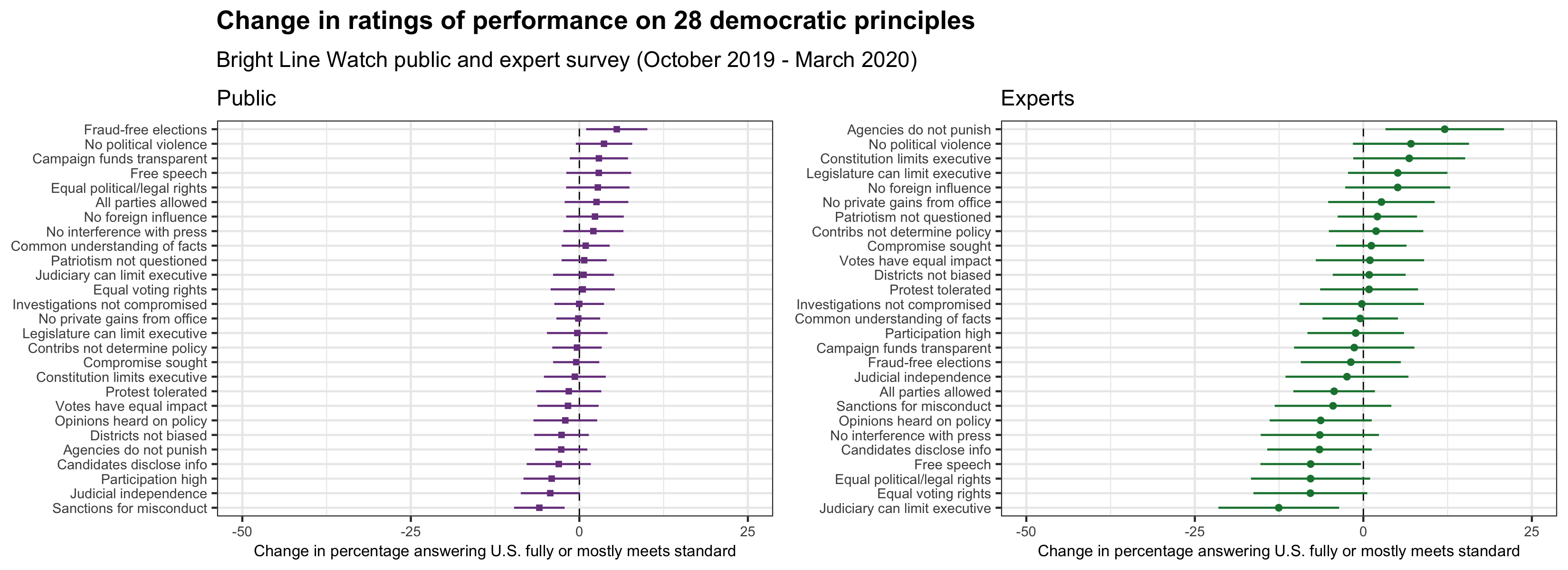President Trump’s impeachment riveted the country in late 2019 and early 2020, but the consequences of his trial and acquittal for American democracy remain unclear. Bright Line Watch’s Wave 10 surveys, which were fielded March 12-April 15, 2020, reveal that the expert and public perceptions of the health of American democracy declined during the period in which the events of impeachment took place. These surveys also examined expert assessments of impeachment-related events and the consequences of impeachment for Trump and future presidents.
We report a number of key findings from these surveys below:
-
-
-
Experts rated American democracy as performing worse in March 2020 than they had in March 2019, our last survey before the impeachment process began. The decline was sharp and reversed the improvements in experts’ ratings that our surveys revealed after the 2018 midterm elections.
-
Among experts, ratings of performance declined on a number of specific democratic principles that were mainly related to impeachment. Compared to one year ago, experts were more skeptical that investigations of public officials were free of political interference, saw fewer checks on executive power, and perceived government agencies as more prone to punishing the government’s political opponents.
-
Turning to our survey of the general public, Americans remain divided in their evaluations of the performance of U.S. democracy. The views of those who approve of President Trump have remained stable over the past year; those who disapprove of the president perceive a decline in democratic performance. The gap between the two is widest on principles of citizen equality and on checks on executive authority.
-
Experts do not regard impeachment as constraining President Trump. To the contrary, they identify many actions he and his allies took during the impeachment process as important and abnormal and indicate that the process as a whole will embolden Trump substantially, an effect they expect will extend to some extent to future presidents as well.
-
-
It is important to note, however, that our survey was fielded under unusual circumstances while the novel coronavirus dominated national attention. Our results are largely consistent with past surveys but it is not yet known how the pandemic affected the responses we received. (We discuss the process by which the survey was fielded further in the Appendix.)
Experts see decline in the state of U.S. democracy since 2019; public divided
Our most recent survey records the worst overall rating of US democratic performance on a 0–100 scale among our expert respondents since Bright Line Watch began asking this question in 2017. The ratings match lows recorded in 2018 in surveys fielded during heated controversies over the separation of families at the southern border, President Trump’s questioning of U.S. intelligence during a press conference with Russian President Vladimir Putin, and the nomination and confirmation of Supreme Court Justice Brett Kavanaugh. Expert ratings rebounded after the 2018 midterm election. Comparing the most recent survey with the one from a year ago, experts rated US democracy lower on 15 of 27 democratic principles. We found improvement on none of the principles. The biggest drops in performance were on items related to accountability, institutional checks and balances, and rights and protections of individuals. As we discuss further below, the principles for which we observe declines closely align with the content of the impeachment inquiry. Thus, while we cannot establish a causal relationship, our results are consistent with the claim that the impeachment had important consequences for expert assessments of the quality of US democracy.
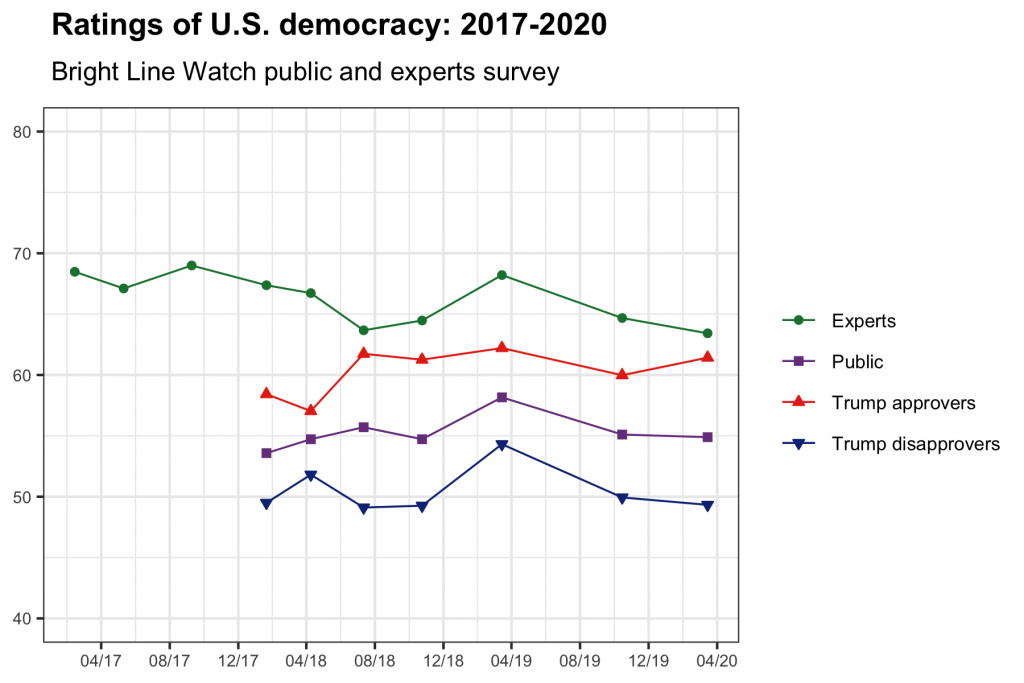
Ratings of US democracy by experts and the public on a 0–100 scale. Public sample is also disaggregated by Trump support. Figure shows average values across survey waves.
As the figure above indicates, expert ratings of the quality of US democracy have fallen by almost five points on our 100-point scale since our March 2019 survey, declining from 68.2 to 63.4. Ratings among the public show a similar decline, dropping from 54.3 in March 2019 to 49.3 in March 2020. Both expert and public evaluations mark substantial declines from a peak after the 2018 elections, which we attributed to an apparent increase in legal and political checks on President Trump following the 2018 midterm election (including investigations into the administration and the President’s associates by law enforcement officials and Congress). The recent declines continue the trend observed in our October 2019 survey, which showed a decline in the perceived performance of US democracy after the disclosure of the whistleblower report on Trump’s Ukraine phone call. The decrease in public ratings of U.S. democracy is driven by Americans who disapprove of Trump; for this group, assessments of democracy declined between March and October 2019 and remained low in our most recent survey. By contrast, ratings were stable among Trump approvers.
The decline observed in overall ratings of U.S. democracy since Wave 8 (March 2019) extends to expert ratings of democratic performance on specific democratic principles. The proportion of experts saying the U.S. “mostly” or “fully” meets the standard in question declined significantly over the last year for 15 out of the 27 principles Bright Line Watch tracked. By contrast, as noted, none improved in any meaningful way (see figure above). These declines range from a small negative shift on sharing a common understanding of facts (-6.4%) to a dramatic decline in perceptions of the judiciary’s ability to limit the executive (-35.3%).
To illustrate this point, the figure below shows the change in the percentage of experts who rate the US as “fully” or “mostly” meeting the standard in question for the 27 democratic principles measured in our most recent three surveys: March 2019 (Wave 8), October 2019 (Wave 9), and March 2020 (Wave 10). We separate the principles into seven categories that Bright Line Watch has employed since the beginning of its surveys: Accountability, Discourse, Elections, Institutions, Protections, Rights, and Voting. Only principles that see a statistically significant change between waves 8 and 10 are labeled and drawn in bold lines.
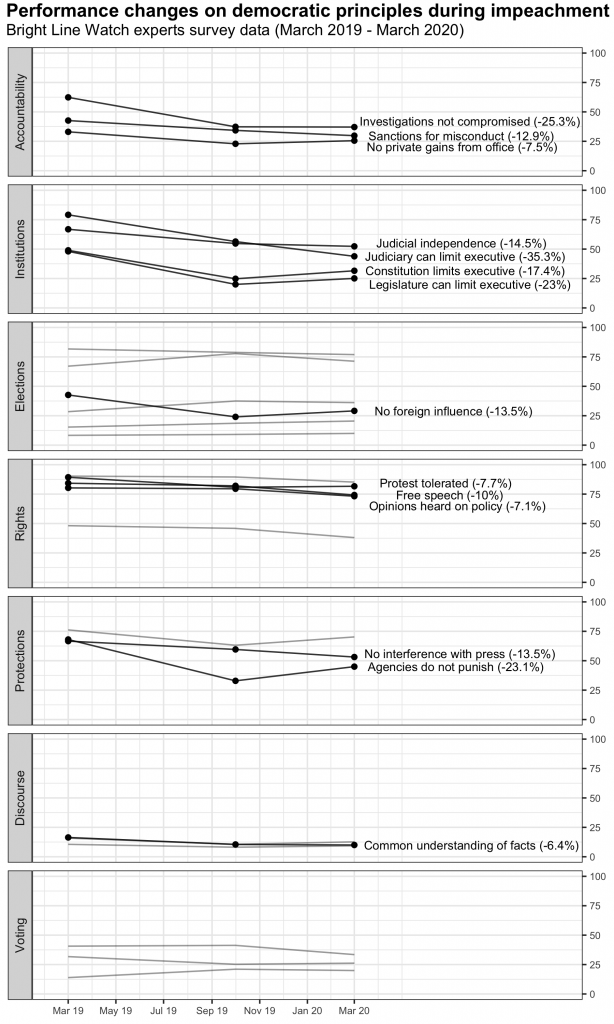
Figure shows changes between surveys conducted in March 2019, October 2019, and March 2020 in the percentage of experts who rate the United States as fully or mostly upholding specific democratic principles. Principles are grouped thematically in each panel. The percentage included in each label indicates the total change from March 2019 to March 2020 for principles where performance changed significantly.
Principles unrelated to impeachment, such as those in voting and elections (other than the obviously related principle of preventing foreign influence), do not see significant changes across the three waves. On the other hand, numerous principles of accountability (the independence of investigations into wrongdoing by public officials, sanctions for misconduct by government officials, and preventing private gains from office), institutional checks and balances (legislative, constitutional, and judicial checks on the executive), and rights and protections (agencies not punishing political opponents) that are closely related to the content of the impeachment investigation and trial declined substantially.
The changes we observe are not simply a reversion to pre-midterm levels. When we compare performance on democratic principles in Wave 10 to our Wave 6 survey, which was fielded in July 2018 and showed the lowest overall ratings of U.S. democracy we have measured, we still find statistically significant declines in the 2020 survey on three principles closely related to impeachment: the legislature can limit the executive (-10.2%), the judiciary can limit the executive (-13.8%), and agencies do not punish political opponents (-15%). These results suggest that impeachment had a lasting effect on expert assessments of U.S. democracy; the recent downturn is not simply the erosion of post-midterm gains.
The public also rated performance worse than in March 2019 on many of the same democratic principles, though the declines were typically smaller than among experts. But the decline is typically smaller than among experts. The figure below shows that the muted response is driven by the polarization we observe in ratings among Trump approvers and disapprovers. We observe substantial declines in perceived performance on principles related to impeachment such as the legislature limiting the executive and the Constitution limiting the executive among disapprovers. However, these decreases are not mirrored among Trump’s supporters. (Notably, both parties see decline in investigations not being compromised, which may reflect dissatisfaction on both sides over how rules and procedures related to impeachment were enforced.)
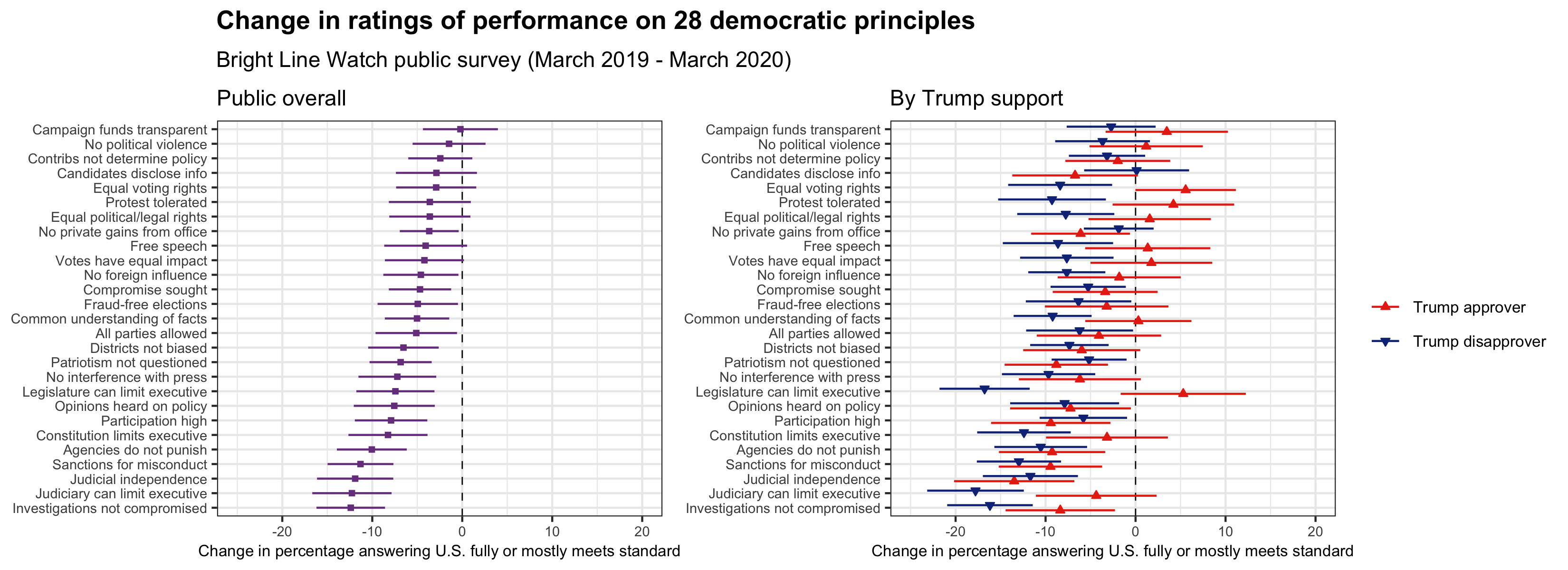
Ultimately, Trump approvers and disapprovers continue to see American democracy through different lenses, but the degree to which they do varies across democratic values. The next figure compares performance assessments on each of our 28 principles across respondents in our public sample who approve or disapprove of President Trump. The dots represent the percentage in each group rating the United States as mostly or fully upholding each standard.
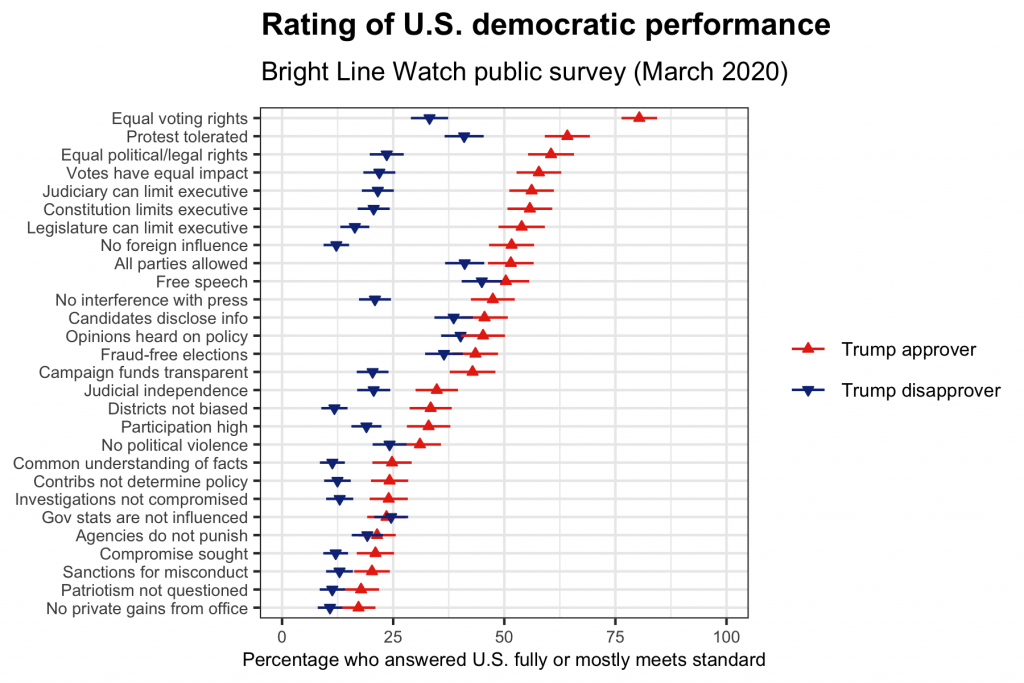
Polarization is most stark in two areas: checks on the executive and equality among citizens. In both, Trump supporters rate performance as high and opponents rate it as low. The top seven items by percentage gap between Trump approvers and disapprovers are the principle of preventing foreign influence on elections, three principles related to equality among citizens (voting rights, vote impact, and legal and political rights), and three principles related to constraints on the executive (by the courts, the legislature, and the Constitution)[1]. Relative consensus exists on some items, but largely reflects shared negative evaluations of democratic performance — for instance, on items related to civil discourse (not questioning opponents’ patriotism, seeking common understanding of facts, and seeking compromise) and malfeasance by public officials (whether they use office for private gain, are sanctioned for misconduct, disclose information about their policy decisions, manipulate statistics, and use public agencies to punish opponents).
Impeachment events mostly abnormal
To better understand impeachment, we asked political science experts to evaluate a number of specific events that occurred during the process as part of our standard battery asking respondents to rate the importance and normalcy of a number of recent events. We note that these items raise important measurement challenges — evaluating normalcy during a historically unusual event like impeachment is difficult (a point raised by many experts). However, among the events we asked respondents to evaluate, the impeachment-related events (highlighted in red) were consistently rated as the most important and abnormal. Within those, numerous actions taken by Trump and his allies were rated between mostly abnormal and abnormal on average (refusing subpoenas, the Senate declining to call witnesses, Trump’s attacks on Schiff, Alan Dershowitz’s constitutional interpretation during the trial, and firing/removing witnesses). By contrast, actions taken by non-Trump actors were generally rated between borderline normal and mostly abnormal or between borderline and mostly normal (House impeaches, Pelosi holds back impeachment articles, Romney’s vote to convict). These findings highlight how the pattern of norm violations during the Trump presidency continued even during impeachment itself.
Impeachment and an emboldened presidency
The implications of impeachment continue to be debated. As a final module, we asked our experts about how they think impeachment will affect the constraints faced by President Trump and future presidents. Specifically, we prompted respondents to reconsider broad, competing arguments about the possible effects of impeachment — that it would reassert presidential accountability to Congress or that impeachment without a Senate conviction would instead weaken limits on the presidency:
“Impeachment is often described as a constitutional power given to Congress to assure checks and balances between the legislator and executive, but its consequences following acquittal are less clear. Some say that the fact of impeachment still constrains the President’s future actions. Others say that the acquittal effectively emboldens current and future holders of the office to further challenge limits on its powers. Now that the impeachment and trial are complete, we would like to know your view.”
We then asked respondents to “consider the House inquiry and the Senate trial as a whole” and to assess whether the process constrained or emboldened both President Trump and future presidents (the order, whether respondents were asked first to assess effects on Trump or on future presidents, was randomized). The results are shown in the figure below, where black points show the mean answer for each category with 95% confidence intervals and the observed response distribution across categories is plotted in grey.
Our results demonstrate strong consensus among our expert sample that impeachment will embolden President Trump (79%) and substantial concern that the effect will be to embolden future presidents (59%). As one expert wrote, “Whether [impeachment] will embolden future presidents depends on whether future presidents have authoritarian tendencies. If they do, like Trump they will likely see this as assurance that they can undermine liberal democracy with impunity, so long as their political party remains loyal to them.” In total, 58% of experts answered that impeachment would embolden both Trump and future presidents, though many indicated the effect would be greater for Trump. For instance, 42% of experts indicated Trump would be emboldened significantly compared to only 17% who said the same of future presidents.
Notes
[1] The appendix includes a variant of this figure, with items presented in descending order of the gap between Trump supporters and opponents.
Appendix
Figure A1
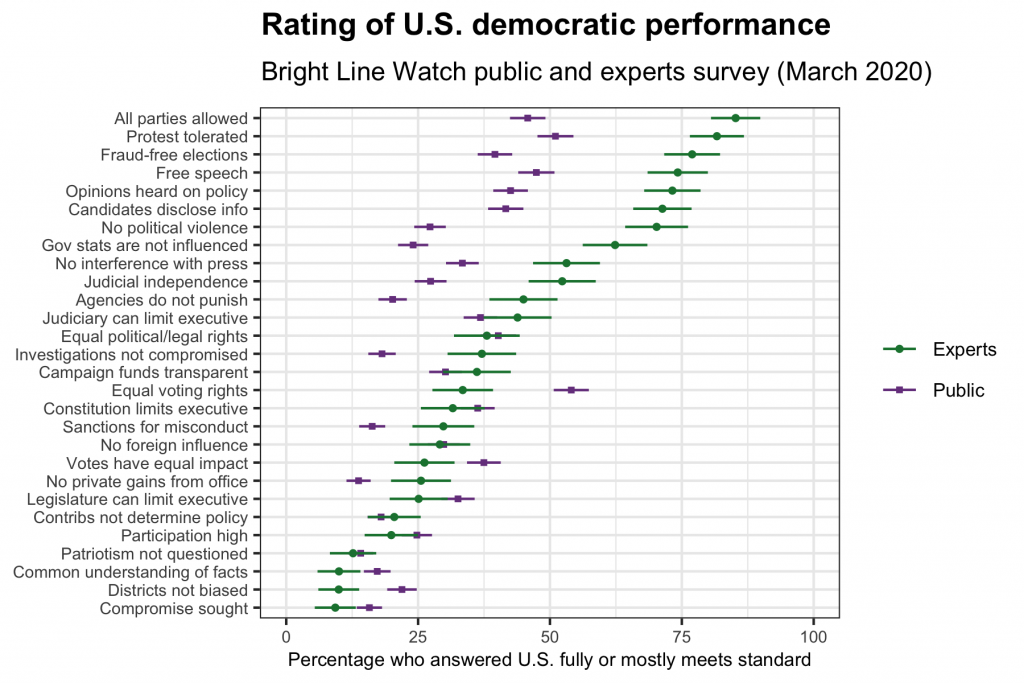
Figure A2
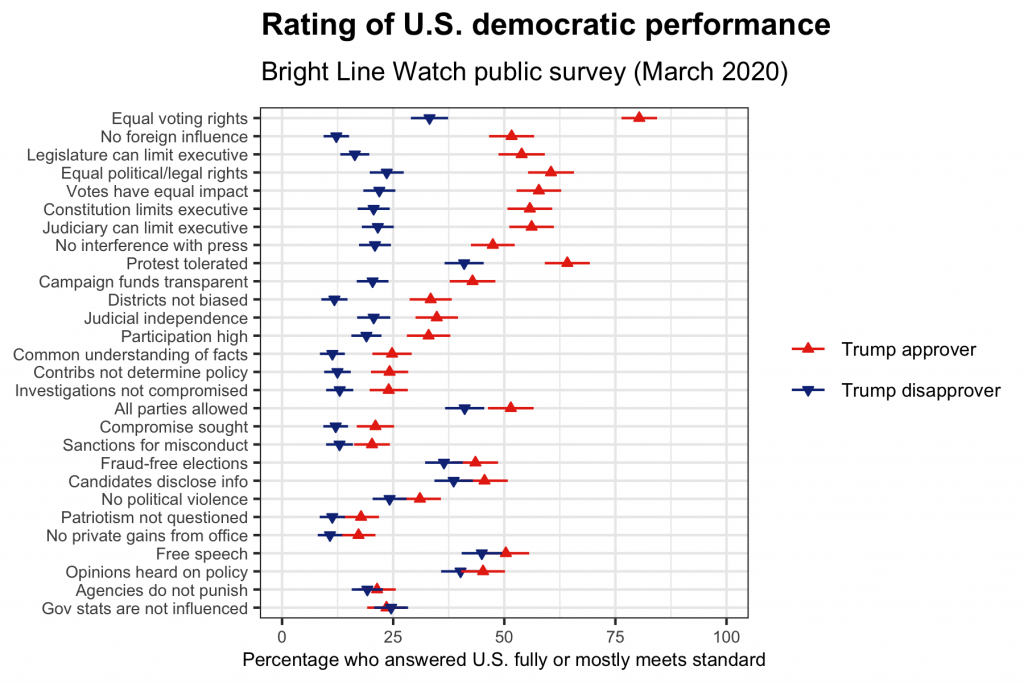
Figure A3
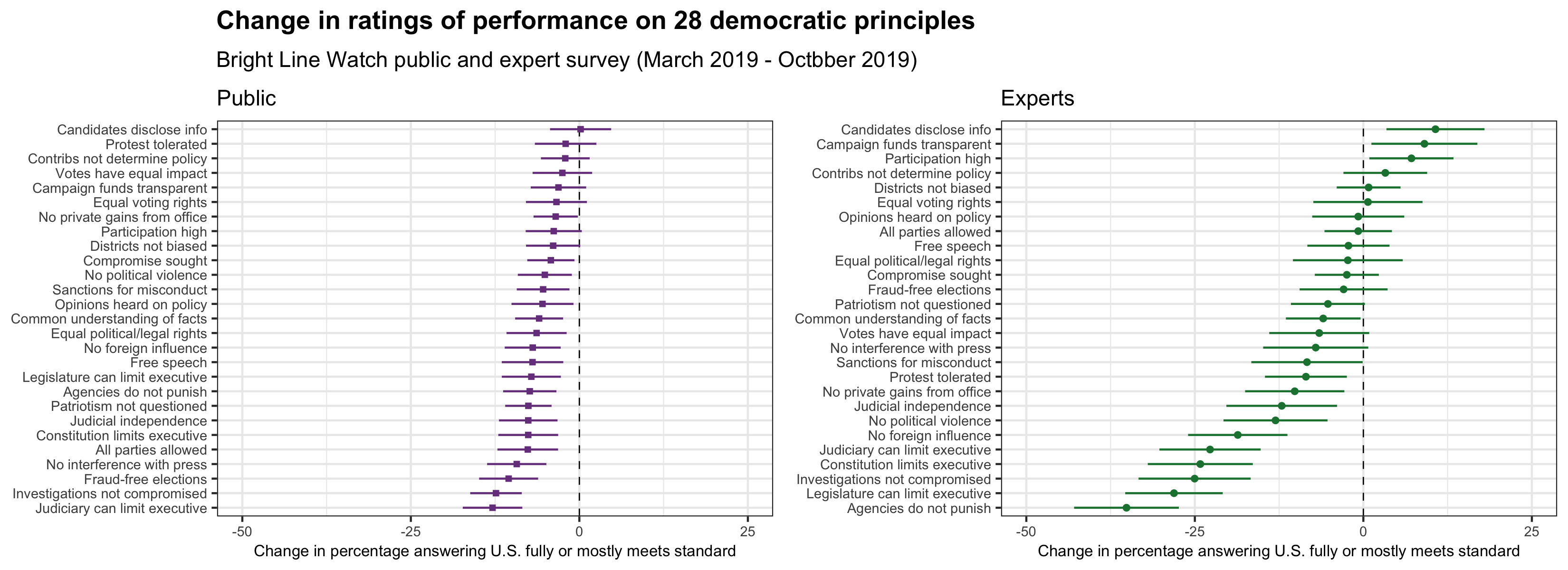
Figure A4
Bright Line Watch surveys on the state of America’s democracy, March 2020
From March 12–April 5, 2020, Bright Line Watch conducted its tenth survey of academic experts, and eighth of the general public, on the quality of democracy in the United States. Our public sample consisted of 2400 survey participants from the YouGov sample who were selected and weighted to be representative of the U.S. adult population. We also surveyed 650 political science experts across a diverse range of subfields (6.2% of solicited invitations). Our email list was constructed from the faculty list of U.S. institutions represented in the online program of the 2016 American Political Science Association conference.
We conducted a soft launch of our surveys starting on March 12, 2020 but delayed outreach to the full expert and public samples until March 23 due to the uncertainty and adjustments affecting universities – and thus our expert survey population – at that stage of the COVID pandemic response. Response rates were similar to recent waves, but the salience of the subject matter of our surveys had been eclipsed by COVID in an unprecedented manner. We still do not know how this environment affects our results and will assess the persistence of the changes in expert and public ratings we observe in future survey waves.
All estimates shown in the report used weights provided by YouGov. Our expert sample is traditionally unweighted because we do not collect demographic data to protect anonymity. Error bars in our graphs represent 95% confidence intervals. Data are available here.
Both the expert and public samples in Wave 10 responded to a battery of questions about democratic performance in the United States (see below). Afterward, they were asked to evaluate the quality of American democracy overall on a 100-point scale. Experts were also asked to evaluate the quality of democracy in their state on the same 0–100 scale. Expert respondents were then asked to respond to a second battery in which they were presented with a series of statements about current political events and asked to rate them on normalcy and importance (the list of events is provided below).
Performance battery
The foundation of Bright Line Watch’s surveys is a list of 28 statements expressing a range of democratic principles (the full list is provided below). Democracy is a multidimensional concept. Our goal is to provide a detailed set of measures of democratic values and of the quality of American democracy. We are also interested in the resilience of democracy and the nature of potential threats it faces. Based on the experiences of other countries that have experienced democratic setbacks, we recognize that democratic erosion is not necessarily an across-the-board phenomenon. Some facets of democracy may be undermined first while others remain intact, at least initially. The range of principles that we measure allows us to focus attention on variation in specific institutions and practices that, in combination, shape the overall performance of our democracy.
Bright Line Watch’s Wave 1 survey included 19 statements of democratic principles. Based on feedback from respondents and consultation with colleagues, we expanded that list to 29 statements in Wave 2. We then reduced that set to a set of 27 statements for the Wave 3 through Wave 8 surveys. 17 of those 27 statements were included in Wave 1, and all 27 were included in Wave 2. We added one statement to the list in Wave 9.
The full set of statements is presented below and grouped thematically for clarity. In the surveys, the principles were not categorized or labeled. Each respondent was shown a randomly selected subset of statements (14 for the public, 10 for experts) and asked to rate the performance of the United States on those dimensions.
Elections
-
-
- Elections are conducted, ballots counted, and winners determined without pervasive fraud or manipulation
- Citizens have access to information about candidates that is relevant to how they would govern
- The geographic boundaries of electoral districts do not systematically advantage any particular political party
- Information about the sources of campaign funding is available to the public
- Public policy is not determined by large campaign contributions
- Elections are free from foreign influence
-
Voting
-
-
- All adult citizens have equal opportunity to vote
- All votes have equal impact on election outcomes
- Voter participation in elections is generally high
-
Rights
-
-
- All adult citizens enjoy the same legal and political rights
- Parties and candidates are not barred due to their political beliefs and ideologies
- Government protects individuals’ right to engage in unpopular speech or expression
- Government protects individuals’ right to engage in peaceful protest
- Citizens can make their opinions heard in open debate about policies that are under consideration
-
Protections
-
-
- Government does not interfere with journalists or news organizations
- Government effectively prevents private actors from engaging in politically-motivated violence or intimidation
- Government agencies are not used to monitor, attack, or punish political opponents
-
Accountability
-
-
- Government officials are legally sanctioned for misconduct
- Government officials do not use public office for private gain
- Law enforcement investigations of public officials or their associates are free from political influence or interference
- Government statistics and data are produced by experts who are not influenced by political considerations
-
Institutions
-
-
- Executive authority cannot be expanded beyond constitutional limits
- The legislature is able to effectively limit executive power
- The judiciary is able to effectively limit executive power
- The elected branches respect judicial independence
-
Discourse
-
-
- Even when there are disagreements about ideology or policy, political leaders generally share a common understanding of relevant facts
- Elected officials seek compromise with political opponents
- Political competition occurs without criticism of opponents’ loyalty or patriotism
-
To measure perceived democratic performance, the survey asked, “How well do the following statements describe the United States as of today?” Each respondent was then presented with 14 statements of principle, randomly drawn from the set above, and offered the following response options:
-
-
- The U.S. does not meet this standard
- The U.S. partly meets this standard
- The U.S. mostly meets this standard
- The U.S. fully meets this standard
- Not sure
-
The order in which statements were presented in the battery was randomized for each respondent so there should be no priming or ordering effects in how they were assessed.
Events
1. House Speaker Nancy Pelosi delays sending articles of impeachment to the Senate
2. US carries out airstrike in Iraq that kills Iranian general Qasem Soleimani
3. Trump pardons Eddie Gallagher, a Navy SEAL charged with war crimes
4. Senate votes against convicting Trump and removing him from office
5. The President tweets that Adam Schiff, the lead House impeachment manager, is “a very sick man” and “has not paid the price, yet, for what he has done to our Country”
6. The President’s lawyer Alan Dershowitz argues “if a president did something that he believes will help him get elected — in the public interest — that cannot be the kind of quid pro quo that results in impeachment”
7. Senate votes to not subpoena additional witnesses in the impeachment trial
8. The Trump administration refuses to cooperate with subpoenas from the House impeachment inquiry
9. U.S. and China agree to Phase 1 trade deal
10. Congress votes to raise the smoking age to 21
11. The Trump administration bars foreign nationals who recently visited China from entering the U.S. due to the coronavirus threat
12. President Trump makes unannounced Thanksgiving Day visit to military base in Afghanistan
13. Congress passes new law that encourages 401(k)s to offer guaranteed payment
14. Department of Justice officials override prosecutors’ sentencing recommendations to recommend a lesser sentence for Roger Stone
15. The Trump administration removes Alexander Vindman from the National Security Council and fires Gordon Sondland as ambassador to the European Union, who were both witnesses in the House impeachment trial
16. The Trump administration and its allies creates lists of disloyal government officials and lists of loyal pro-Trump figures who could replace them
17. President Trump names a political ally as the new acting Director of National Intelligence who previously served as ambassador to Germany
18. Trump awards Presidential Medal of Freedom to Rush Limbaugh
19. The House votes to impeach President Trump for abuse of power and obstruction of justice
20. Senate Minority Leader Chuck Schumer says, “Justice Kavanaugh and Justice Gorsuch, you have unleashed a whirlwind, and you will pay the price” in reference to a pending Supreme Court case on abortion
21. Senator Mitt Romney votes to convict President Trump in the impeachment trial for abuse of power
22. President Trump calls for Justice Sotomayor and Justice Ginsberg to recuse themselves from cases related to the Trump administration

